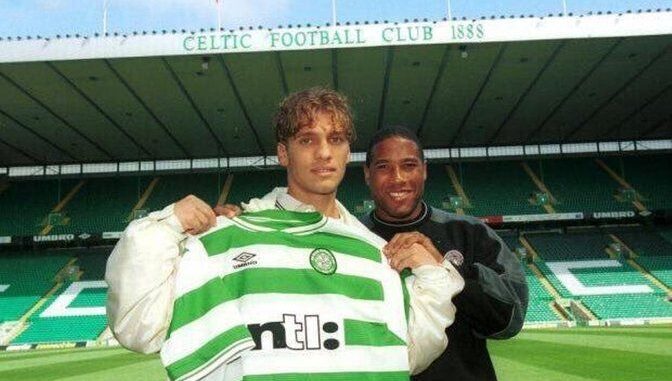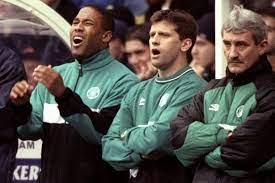
After losing the Scottish Cup to Inverness Caley Thistle on February 8, 2000, John Barnes paid the ultimate price when he was fired after just eight months on the job.

Now, Celtic had to pull themselves up from the ruins of the most embarrassing outcome in the team’s history.
In a subsequent CQN EXCLUSIVE series, we will be examining the Parkhead club’s efforts to rebound from such a
devastating loss, a dramatic collapse that prompted a drastic change that thrust Celtic into a new era.
Part Ten of the edited excerpts from “The Winds of Change,” the 2015 CQN tribute book written by Celtic novelist
Alex Gordon.
Chief Executive Allan MacDonald claims that John Barnes approached him in the midst of the chaos surrounding
Caley Thistle’s collapse and asked, “What do I do next?”
“I don’t know, but I’ll let you know,” was MacDonald’s response.
The press had heard about the chaos in the dressing room and was curious to learn more. Barnes retorted, “There
was a little issue. There’s really no purpose in disguising the fact that there was a crisis.
There will be meetings regarding the seriousness of the issue in the upcoming days. We will then issue a statement
after that.
After spending time at his vacation house in La Manga, Kenny Dalglish had missed the fiasco. On the eve of a Scottish
Cup tie, MacDonald made it apparent that he would have preferred to have the club’s Director of Football Operations
present at Parkhead.
“I requested that he stay,” said the head of the club. The next day, Dalglish came back as MacDonald filled the void.
He intended to assign the team’s management to the club icon. That was the answer, he said. I said, “You run the
show because he [Barnes] wasn’t managing the dressing room,” to the Director of Football Operations. When Kenny
returns, John starts working for him. However, John was sacked because he refused.
Terry McDermott and Eric Black were also shown the door. Barnes was permitted to spend £5 million on a Brazilian
center-half named Rafael Scheidt from Gremio just before he was fired. He arrived bearing three full caps for his
country and full recommendations.
Nobody had considered the fact that Coca-Cola, the world’s largest soft drink company, had sponsored Brazil in the
1990s and insisted on the squad playing at least one match every month. Players from all throughout the nation were
awarded caps for friendly international matches that were not competitive.
In addition, Scheidt asserted that he turned down AC Milan in favour of Celtic. When Martin O’Neill took over, he
was ejected from the team after only one first-team appearance, a 4-1 victory against St Johnstone in March.
Dalglish quickly disassociated himself from the Scheidt arrangement. “John was the one who signed every player at
Celtic,” the man stated. Even if there were more nasty people than good people, I’m not sure who was the worst.
There was “never a prospect,” Allan MacDonald acknowledged, of Dalglish becoming Celtic’s full-time manager. The
process of finding a new head coach had already begun.
Dalglish wouldn’t return to the dugout in the upcoming season unless there was a drastic change in his plans. He
would lead the team for the balance of the campaign and assist in finding a long-term replacement for his late friend.
After three days of nonstop bitter bloodletting, Celtic supporters decided enough was enough. Four days after the
Caley disaster, the fans, having shown such consideration and reassuring consistency in the past, went back to work
to assist Dalglish and his struggling players when they went to Dens Park to play Dundee.
They encouraged the team tremendously, particularly during the second half when they helped their team to three
late goals and a well-earned win.
For the first time since being fired by Newcastle in September 1998, Dalglish managed a team. Immediately, six
players from the starting lineup were benched. Dmitri Kharine returned for just his third start in his Hoops career
after Jonathan Gould was fired.
Additionally, Regi Blinker was fired, while Mark Burchill, Colin Healy, Olivier Tebily, and Eyal Berkovic were
benched.
To the surprise of many, Dalglish chose to put Mark Viduka up front. The second half saw enough of the light snow
drift that had swirled around at kickoff to justify the use of an orange ball.
Johan Mjallby headed home the first goal from Lubomir Moravcik’s corner kick with just 23 minutes remaining.
After two minutes, Moravcik found Viduka on the left wing with a through ball. Viduka cut inside and then slid a low
right-foot drive from outside the box into the corner of Rab Douglas’ net.
Eight minutes from time, Healy, the substitute, beat the future Celtic player once more with a deft lofted ball that
covered a full 35 yards.
“The fans gave me and the players a wonderful reception,” Dalglish remarked. That was a factor in our victory. The
players responded well when we directed them in the proper direction today, which is what we had to accomplish.
“I was not able to ask for a better reaction from them. Given how strong Dundee is, this game was always going to be
challenging. Thus, the boys put up a strong display to win by three goals.
“I must admit that I never imagined that I would be leaving the tunnel in Dens Park.
“The last time I did it was as a player, and even though I have returned frequently, it has always been in the directors’
box and boardroom, which is a little different.”
Get more related update on…sportupdates.co.uk

Leave a Reply